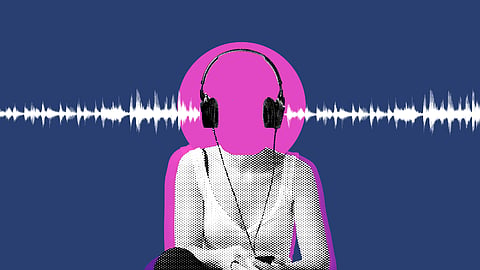

Most people would agree that music is like therapy. All the elements of music — the lyrics, the way the guitar strums, the different combinations of do re mi(s), and the thumping beats — come together to make what we know as music. To each genre, the use of these elements changes. Coming together to sounds that may be liked by some and not by others. However, irrespective of the choices, it is seldom difficult to pinpoint what works best from a certain piece of music. Sometimes, it's the lyrics or the beats. While other times it's the composition that works.
Irrespective of the genre, this has been my most general notion about music since the beginning. The one with all the bandwagon — lyrics, beats, instruments and whatnot.
But recently, I was introduced to another type of music called "Binaural Beats". As I was told, these beats are believed to improve focus, help relax your brain and also meditate. And so, I began to find answers of my own on the effectiveness of these binaural beats. I would like to confess, at first I did not believe that these beats could induce relaxation or help me focus better. Mostly because I am a heavy listener of (regular) music, and this form (binaural beats) did not quite fit into the already known category. But I have been listening to them for a week now, and here is what I found.
The science
Upon coming to know about it, my first instinct was to look for more information on how binaural beats work. I wanted to know what about these beats helped induce better sleep or focus.
WebMD explains that a binaural beat is an illusion created by the brain when you listen to two tones with slightly different frequencies at the same time.
It is similar to an optical illusion, but this time for the brain.
Because the brain is listening to two tones at once, it interprets the beats in a frequency of its own. Your brain interprets the two tones as a beat of its own. Which is at a different frequency. This frequency, that the brain interprets the beats at, is the difference between the two Hertz (Hz).
Simply put, if the music is being played at 440 Hz and 444 Hz tone respectively, then the brain would interpret it at 4 Hz. Eventually, there is a form of synchronisation created in the brain, which leads to the person hearing a single tone instead of two different ones.
So what happens in the brain?
When you listen to these beats, your brain activity (apparently) matches the frequency set by the frequency of the beats. This change in frequency is called the frequency-flowing effect.
This effect further causes our brain to harmonize the brainwaves in both hemispheres known as neural entrainment. Hence, aligning brainwaves and bringing a rhythmic pattern to them.
However, there is not much scientific proof available on the efficacy of these binaural beats. Research on the matter also most times looks for specific outcomes — improved concentration, better focus, etc — But, what is more, important to understand is how the beats affect activity in the brain and then measuring results.
What are the claimed benefits of listening to binaural beats?
Binaural beats are believed to induce a similar state in the brain that is achieved in deep meditation. However, this is achieved much more quickly than compared to the practice that a deep meditative state requires. Beats in the range of 1 and 30 Hz are known to create brainwave patterns similar to meditation.
Naturally, if the sound is believed to create a brainwave pattern similar to meditation, the benefits of it are on similar lines. These beats allegedly help in reducing anxiety, lowering stress, increasing relaxation, fostering positive moods, promoting creativity and also managing pain.
But do these beats work?
Though there is not enough research and proof that suggests that benefits of listening to binaural beats, a study conducted with blinded people showed improved performance on given tasks. It also showed an improvement in mood.
Some research has also suggested a reduction in anxiety after prolonged exposure to binaural beats. Another comparatively large-scale study looked at the effect of binaural beats on 291 people admitted to the emergency ward of a hospital. The patients showed lowered levels of anxiety.
Final verdict
Its been over a week that I have been listening to binaural beats while working and though I am unsure about how much the brainwave sync has helped me. But I can testify that the beats put your mind in a state of flow and thoughts are easier to process. Since there are no harmful effects of listening to the music, apart from listening to music on very high volume. The music can help improve your focus on work.
